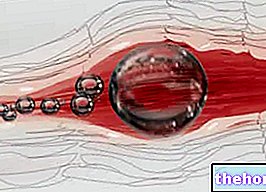Generality
Allergic asthma is an inflammatory disease of the respiratory system, caused by an excessive reactivity to various allergenic stimuli (eg pollen, mold, dust mites or pet hair) present in the external environment.

The symptoms of this condition are usually chronic or intermittent. In any case, the severity and variety of manifestations are highly subjective, as they vary according to the person affected: asthma attacks can range from a simple wheeze to "severe respiratory failure, which requires hospitalization.
The diagnosis of allergic asthma is based on the medical history, physical examination and lung function tests. Treatment includes control of triggers and drug therapy, most commonly with bronchodilators, beta 2 agonists, and inhaled corticosteroids.
What is an allergy?
An allergy is a condition characterized by an abnormal reactivity of the immune system towards one or more substances (called allergens), present in the external environment and usually harmless for most individuals.
The body of allergic subjects recognizes these allergens as a danger and tries to fight them by producing a particular type of antibodies, called Immunoglobulins E (IgE).




























